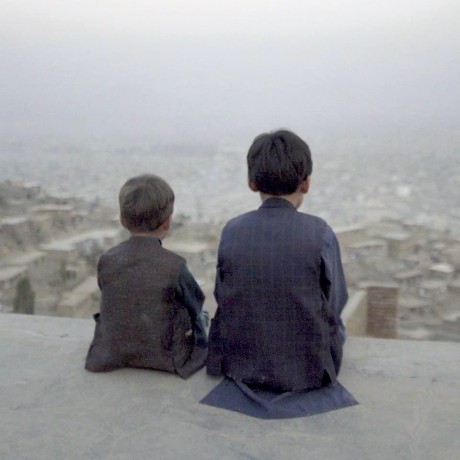


Aboozar Amini: Kabul, City in the Wind

It’s about creating the feeling of being there. To quote Richard Leacock. First time feature length director Afghan Aboozar Amini, who emigrated from the country when a teenager, was educated in Holland and in the UK, does that. Takes us there, to the dusty and windy and dirty Afghan capital Kabul, where he lets us meet three protagonists: a bus driver Abas and two kids, brothers, the small Benjamin and the bigger Afshin.
The brothers live up the hill of the city – with another brother Hussein, too
small for the film and a mother, who we do not see. But we hear her worried voice, when the brothers are late from a tour down to the city below. The crowded and noisy Kabul. The father, however, is present in the beginning of the film, where he takes his boys to a memorial for victims of a bomb. “My best mate was killed” on this occasion, I was injured, he says and explains that he has to leave the home – someone is after me. Later on in the film Afshin tells us that the father was in Kandahar – Taliban area – resigned from the military, came home and now he is leaving, giving Afshin, as the oldest male in the family, the task to be responsible for the family. Don´t forget to water the trees, that stand outside the house without leaves as something that could bring some hope in a war-torn country. The father leaving serves as a frame for the touching story about the brothers, who at the end of the film in a telephone conversation tell the father, what they have done so well, they held their promises but the last sentence from the tiny Benjamin goes like this: Come Home Dad!
Amini follows the brothers in wonderful scenes, where they are going down the hill to do shopping. Big brother scolds little brother for not moving quick enough – next time I am taking Hussein instead of you! – it is quite recognizable, they have a childhood like kids everywhere, they play, they talk about what they want to be when they grow up – Benjamin a policeman, of course – but their games are games that boys play in a country, where bad things can happen any time: “Yellow Kitty, stay at home, don’t go to war, you’ll die”, sings Benjamin. Both kids add to the film the sense of fear through close ups, where they face to the camera tell their dreams and thus express their feelings, as does the driver right upfront in the film.
Abas has bought a bus, rather outdated and in poor shape. He is pretty much visiting the mechanics, joking with them, smoking all kind of stuff with them promising to pay for the repair of the car but he has no money, and he leaves the bus business (did I write business!) to earn in other ways – “honesty does not work in Afghanistan”. He sees friends – it´s a location that comes back regularly – in the café, where they talk about where the last bomb fell and with how many casualties. At home you see him playing with the daughters while his wife (would have loved to have some more with her) is sewing nice things that give them an income. He feels bad, he says, that he can´t contribute. “I have wasted 30 years of my life on problems and survival”, he says, and also he, like the kids, tell his dreams… about loss and death.
Amini elegantly cuts from the kids to the adult, the rhythm is right, the mood as well, and there is space for great almost wordless scenes like the one, where Afshin plays football with a can on the way down, a sequence that the debutant feature length director with his documentary eye dares to hold for a long time. And the songs they sing, I have mentioned the kid singing, Abas sings when he is sad with lyrics like “Afghanistan my homeland, my homeland of bandits”.
We have seen films from New York, Paris, Amsterdam, Copenhagen… here is one, a very good one from Kabul. About three human beings you get to know and love. Thank you!
The film was yesterday the opening film of IDFA, there are many screenings coming up. Watch out for them.
2018, Netherlands, Afghanistan, Japan, Germany, 88 mins.